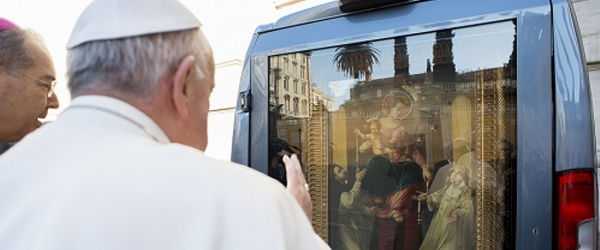His wife had rushed to identify her husband’s body, and found him sitting in the morgue’s hallway, very much alive. The article includes a photo of him, holding his death certificate.
In today’s Gospel reading, we encounter the story of Jesus raising his friend Lazarus from the dead. Lazarus has been in his tomb for four days, and no one really wants Jesus to open it. “Lord, by now there will be a stench,” Lazarus’ sister Martha tells Jesus.
Of course, Jesus is undeterred, calling, “Lazarus, come out,” and the dead man stumbles out of his tomb, still wrapped in his burial cloth.
“O my people, I will open your graves and have you rise from them,” the prophet Ezekiel tells us in today’s first reading. “Then you shall know that I am the Lord, when I open your graves and have you rise from them, O my people!”
God opens the grave of Lazarus, and the grave of Jesus, and the graves of all of us. That is at the heart of the good news of the Gospel. And while it is comforting to know that God promises to raise us from physical death, we are also challenged to believe that God can restore our spiritual lives and restore our joy and peace when we feel spiritually dead.
Lent is a time when we are called not to dwell on our failures but to move beyond them, and to remember that God’s love is unconditional and unlimited.
“Come out,” Jesus calls to Lazarus. He might be saying the same thing to each of us when we experience pain and suffering and may be tempted to resign ourselves to that state. In this time of economic crisis, and as the world sits stunned looking at the series of disasters that have struck Japan, and the protests that have destabilized vast parts of Africa and the Middle East, we may feel overwhelmed by the difficulties in our lives and in our worlds.
Lent is a time for us to wake up, to remind ourselves that the love of God is more powerful than any darkness that we encounter, and to shed any trappings of resignation or surrender to negativity or despair. Lent is a time when we are called not to dwell on our failures but to move beyond them, and to remember that God’s love is unconditional and unlimited; it is not bound by the physics of the world or by our own self-criticism. The story of Lazarus tells us that there is nothing in our lives or in our world that the love of God cannot overcome.
We are days away from the central event of our faith, the resurrection of Christ. It is where we see once and for all that there is nothing more powerful than God’s love. We are called not just to re-enact or remember this truth, but to experience it. It is not easy when we are suffering, but it is possible. We can wake up, arise and live.
Bill Peatman writes from Napa. He may be reached at [email protected].
{gallery width=100 height=100}gallery/2011/0408/peatman/{/gallery}

